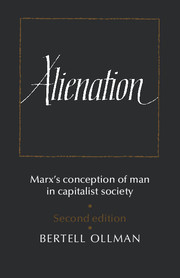Book contents
- Frontmatter
- Contents
- Preface to the second edition
- Note on translations
- Acknowledgements
- General introduction
- PART I PHILOSOPHICAL INTRODUCTION
- PART II MARX'S CONCEPTION OF HUMAN NATURE
- PART III THE THEORY OF ALIENATION
- 18 The theory of alienation
- 19 Man's relation to his productive activity
- 20 Man's relation to his product
- 21 Man's relation to his fellow men
- 22 Man's relation to his species
- 23 The capitalist's alienation
- 24 The division of labor and private property
- 25 The labor theory of value: labor-power
- 26 Value as alienated labor
- 27 The metamorphosis of value
- 28 The fetishism of commodities
- 29 Class as a value Relation
- 30 State as a value Relation
- 31 Religion as a value Relation
- 32 Marx's critique of bourgeois ideology
- PART IV CONCLUSION
- Appendix I In defense of the philosophy of internal relations
- Appendix II Response to my critics: more on internal relations
- Notes to the text
- Bibliography of works cited
- Index of names and ideas
- Cambridge Studies in the History and Theory of Politics
22 - Man's relation to his species
Published online by Cambridge University Press: 05 June 2012
- Frontmatter
- Contents
- Preface to the second edition
- Note on translations
- Acknowledgements
- General introduction
- PART I PHILOSOPHICAL INTRODUCTION
- PART II MARX'S CONCEPTION OF HUMAN NATURE
- PART III THE THEORY OF ALIENATION
- 18 The theory of alienation
- 19 Man's relation to his productive activity
- 20 Man's relation to his product
- 21 Man's relation to his fellow men
- 22 Man's relation to his species
- 23 The capitalist's alienation
- 24 The division of labor and private property
- 25 The labor theory of value: labor-power
- 26 Value as alienated labor
- 27 The metamorphosis of value
- 28 The fetishism of commodities
- 29 Class as a value Relation
- 30 State as a value Relation
- 31 Religion as a value Relation
- 32 Marx's critique of bourgeois ideology
- PART IV CONCLUSION
- Appendix I In defense of the philosophy of internal relations
- Appendix II Response to my critics: more on internal relations
- Notes to the text
- Bibliography of works cited
- Index of names and ideas
- Cambridge Studies in the History and Theory of Politics
Summary
The last of the four broad relations Marx uses to reconstruct man's alienation in capitalist society is the tie between the individual and his species. Species, as we saw, is the category of the possible, denoting in particular those potentialities which mark man off from other living creatures. In so far as the conditions of communism allow an individual to develop and express all that he is capable of as a human being, communist man and species man are identical. When, therefore, Marx claims that ‘estranged human labor estranges the species from man’, he is saying that the unique configuration of relations which distinguishes the individual as a human being has been transformed into something quite different by the performance of capitalist labor.
Man's relation to his species differs qualitatively from the other relations that were examined. His relations to his work, product and other men are tangible, both ends of which exist in the present, while the relation between man and his species is removed, in which living people are measured by the standard of what it means to be a man. Perhaps this facet of alienation can be more clearly grasped if we consider it a reformulation of man's alienation in his work, product and other men, viewed now from the angle of the individual's membership in the species.
- Type
- Chapter
- Information
- AlienationMarx's Conception of Man in a Capitalist Society, pp. 150 - 152Publisher: Cambridge University PressPrint publication year: 1977



